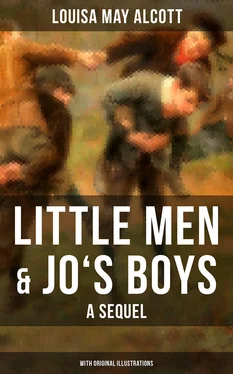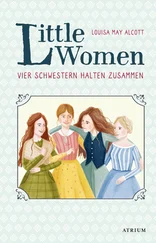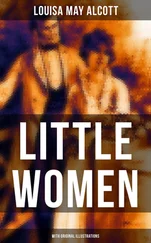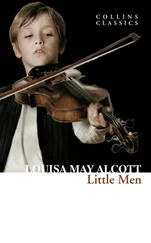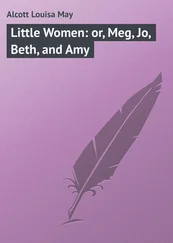1 ...7 8 9 11 12 13 ...30 "But we don't like cricket," said Demi.
"Perhaps not now, but you will when you know it. Besides, you do like to be generous, and the other boys want to play, and you can give them the new ground if you choose."
This was taken them both on the right side, and they agreed to the bargain, to the great satisfaction of the rest.
There was a little more talk about the gardens, and then they all sang together. The band delighted Nat, for Mrs. Bhaer played the piano, Franz the flute, Mr. Bhaer a bass viol, and he himself the violin. A very simple little concert, but all seemed to enjoy it, and old Asia, sitting in the corner, joined at times with the sweetest voice of any, for in this family, master and servant, old and young, black and white, shared in the Sunday song, which went up to the Father of them all. After this they each shook hands with Father Bhaer; Mother Bhaer kissed them every one from sixteen-year-old Franz to little Rob, how kept the tip of her nose for his own particular kisses, and then they trooped up to bed.
The light of the shaded lamp that burned in the nursery shone softly on a picture hanging at the foot of Nat's bed. There were several others on the walls, but the boy thought there must be something peculiar about this one, for it had a graceful frame of moss and cones about it, and on a little bracket underneath stood a vase of wild flowers freshly gathered from the spring woods. It was the most beautiful picture of them all, and Nat lay looking at it, dimly feeling what it meant, and wishing he knew all about it.
"That's my picture," said a little voice in the room. Nat popped up his head, and there was Demi in his night-gown pausing on his way back from Aunt Jo's chamber, whither he had gone to get a cot for a cut finger.
"What is he doing to the children?" asked Nat.
"That is Christ, the Good Man, and He is blessing the children. Don't you know about Him?" said Demi, wondering.
"Not much, but I'd like to, He looks so kind," answered Nat, whose chief knowledge of the Good Man consisted in hearing His name taken in vain.
"I know all about it, and I like it very much, because it is true," said Demi.
"Who told you?"
"My Grandpa, he knows every thing, and tells the best stories in the world. I used to play with his big books, and make bridges, and railroads, and houses, when I was a little boy," began Demi.
"How old are you now?" asked Nat, respectfully.
"'Most ten."
"You know a lot of things, don't you?"
"Yes; you see my head is pretty big, and Grandpa says it will take a good deal to fill it, so I keep putting pieces of wisdom into it as fast as I can," returned Demi, in his quaint way.
Nat laughed, and then said soberly,
"Tell on, please."
And Demi gladly told on without pause or punctuation. "I found a very pretty book one day and wanted to play with it, but Grandpa said I mustn't, and showed me the pictures, and told me about them, and I liked the stories very much, all about Joseph and his bad brothers, and the frogs that came up out of the sea, and dear little Moses in the water, and ever so many more lovely ones, but I liked about the Good Man best of all, and Grandpa told it to me so many times that I learned it by heart, and he gave me this picture so I shouldn't forget, and it was put up here once when I was sick, and I left it for other sick boys to see."'
"What makes Him bless the children?" asked Nat, who found something very attractive in the chief figure of the group.
"Because He loved them."
"Were they poor children?" asked Nat, wistfully.
"Yes, I think so; you see some haven't got hardly any clothes on, and the mothers don't look like rich ladies. He liked poor people, and was very good to them. He made them well, and helped them, and told rich people they must not be cross to them, and they loved Him dearly, dearly," cried Demi, with enthusiasm.
"Was He rich?"
"Oh no! He was born in a barn, and was so poor He hadn't any house to live in when He grew up, and nothing to eat sometimes, but what people gave Him, and He went round preaching to everybody, and trying to make them good, till the bad men killed Him."
"What for?" and Nat sat up in his bed to look and listen, so interested was he in this man who cared for the poor so much.
"I'll tell you all about it; Aunt Jo won't mind;" and Demi settled himself on the opposite bed, glad to tell his favorite story to so good a listener.
Nursey peeped in to see if Nat was asleep, but when she saw what was going on, she slipped away again, and went to Mrs. Bhaer, saying with her kind face full of motherly emotion,
"Will the dear lady come and see a pretty sight? It's Nat listening with all his heart to Demi telling the story of the Christ-child, like a little white angel as he is."
Mrs. Bhaer had meant to go and talk with Nat a moment before he slept, for she had found that a serious word spoken at this time often did much good. But when she stole to the nursery door, and saw Nat eagerly drinking in the words of his little friends, while Demi told the sweet and solemn story as it had been taught him, speaking softly as he sat with his beautiful eyes fixed on the tender face above them, her own filled with tears, and she went silently away, thinking to herself,
"Demi is unconsciously helping the poor boy better than I can; I will not spoil it by a single word."

The murmur of the childish voice went on for a long time, as one innocent heart preached that great sermon to another, and no one hushed it. When it ceased at last, and Mrs. Bhaer went to take away the lamp, Demi was gone and Nat fast asleep, lying with his face toward the picture, as if he had already learned to love the Good Man who loved little children, and was a faithful friend to the poor. The boy's face was very placid, and as she looked at it she felt that if a single day of care and kindness had done so much, a year of patient cultivation would surely bring a grateful harvest from this neglected garden, which was already sown with the best of all seed by the little missionary in the night-gown.

CHAPTER IV
STEPPING-STONES
Table of Contents
When Nat went into school on Monday morning, he quaked inwardly, for now he thought he should have to display his ignorance before them all. But Mr. Bhaer gave him a seat in the deep window, where he could turn his back on the others, and Franz heard him say his lessons there, so no one could hear his blunders or see how he blotted his copybook. He was truly grateful for this, and toiled away so diligently that Mr. Bhaer said, smiling, when he saw his hot face and inky fingers:
"Don't work so hard, my boy; you will tire yourself out, and there is time enough."
"But I must work hard, or I can't catch up with the others. They know heaps, and I don't know anything," said Nat, who had been reduced to a state of despair by hearing the boys recite their grammar, history, and geography with what he thought amazing ease and accuracy.
"You know a good many things which they don't," said Mr. Bhaer, sitting down beside him, while Franz led a class of small students through the intricacies of the multiplication table.
"Do I?" and Nat looked utterly incredulous.
"Yes; for one thing, you can keep your temper, and Jack, who is quick at numbers, cannot; that is an excellent lesson, and I think you have learned it well. Then, you can play the violin, and not one of the lads can, though they want to do it very much. But, best of all, Nat, you really care to learn something, and that is half the battle. It seems hard at first, and you will feel discouraged, but plod away, and things will get easier and easier as you go on."
Читать дальше
